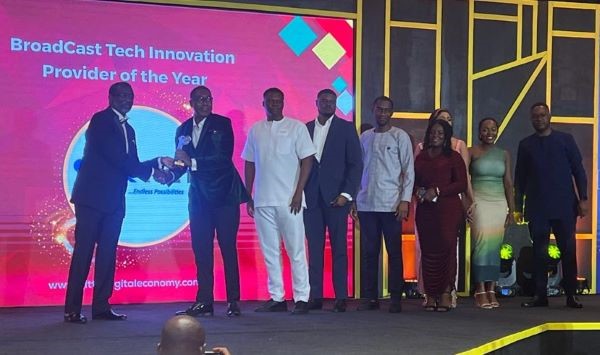K-NET, one of Africa’s leading broadcasting technology and IoT companies has once again been recognized for its commanding role in that space, picking two top awards at this year’s Ghana Information Technology and Telecom Awards (GITTA).
The company was adjudged Broadcast Technology Innovation Provider of the Year and its founder and CEO, Richard Hlomador was also admitted into the Telecommunications Hall of Fame, joining other industry greats honoured at GITTA in the past.
Many Ghanaians only associate K-NET with the establishment and management of the country’s Digital Terrestrial Television (DTT) platform. But the company’s rich experience in establishing and running shared infrastructure successfully in both the broadcasting technology and telecoms space is way bigger than what it does with the DTT platform. This is why K-NET is worthy partner in any shared infrastructure project to be executed in Ghana and across Africa.
Since its establishment in 1996, K-NET has largely remained a silent technology giant that has remained off the media spotlight. The irony here is that, even though K-NET is a major force behind the digitalization of Ghana’s media industry, it seldom features in the media. It also does so much more in the technology space that not many know about, except the several institutional clients such as telcos, banks, insurance companies, state institutions and many more who serve millions of Ghanaians on the back of infrastructure powered by K-NET.
Beyond its work in DTT, K-NET is also a telecommunications company and an internet service provider with tremendous institutional knowledge and experience in ICT solutions, specializing in the delivery of innovative communication products and business solutions for corporate organizations, government agencies, military and the general consumer public. Its focus is in delivering world-class solutions tailored for the needs of local and international customers in the following service areas;
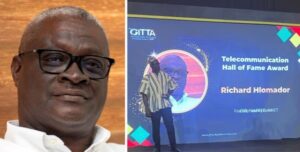
Teleport, Broadcasting (DTT, DTH, DAB), Wide Area Networks, Data Center, eCommerce, Rural Telephony, Solar Power Plants, Long Term Evolution (LTE), Private 4G, 4G over Satellite, and IOT.
Teleport
KNET boasts of a world-class Satellite Teleport which is a satellite operator agnostic and has multiple Earth Station Antennae (ESA), Radio Frequency Transmitters (RFT) and multiple VSAT hubs which are fully integrated for various service delivery on any satellite.
The company has arguably the best-in-class teleport service in Ghana using its 11.3m VSAT teleport and hub located at McCarthy Hills in Accra, built with state-of-the-art systems for high level service delivery. Its teleport services provide long-term and occasional solutions to broadcast clients in Ghana and parts of Africa, who operate Digital Terrestrial Television (DTT) and or Direct to Home (DTH) platforms and channels.
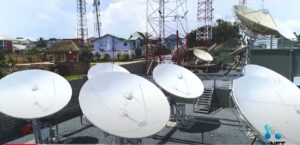
Beyond the teleport hub at McCarthy Hill, K-NET also has several points of presence (POP). It is also the first to design and implement a DTT network in Ghana and currently has several DTT Distribution Points across the length and breadth of country, through which it gives Ghanaians access to quality television viewing. There are at least 12 POPs in Accra, and one each in Tema, Takoradi, Tamale and Kumasi; while the company also runs about 40 DTT Distribution Points in several communities all the way from Accra to the north.
National DTT Head-end
K-NET is also the main force behind Ghana’s National DTT infrastructure and it currently manages the National DTT Head-end at Kanda in Accra. This gives the company 24/7 visibility of what is happening in terms of television viewing experience in all homes and offices across the country in real time. It runs a system that ensures that measures are in place to resolve any emerging challenges remotely and seamlessly. When it becomes necessary to get on the field, K-NET has well equipped vehicles that do test rides in communities and do real time testing and fixing of challenges. But when K-NET engineers fix challenges, people tend to think their respective TV stations did the job.
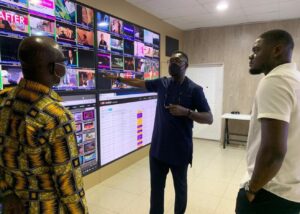
The ubiquity of K-NET, is such that currently, all television stations in Ghana are riding on the K-NET DTT and DTH (direct-to-home) infrastructure to get into people’s homes, offices, hotels, bars and what-have-you. It means without K-NET, an overwhelming majority of Ghanaians will not even get to watch digital TV.
DTH
Everybody knows MultiTV. But the truth is, the operators of MultiTV, which is the Multimedia Group, only provide the content. The infrastructure behind MultiTV is owned and managed by K-NET. That is the power of K-NET.
Beside MultiTV, Ghanaians have recently seen the HD+ decoder making waves in Ghana. Again, K-NET owns commanding shares in WAPS, the company that owns and manages HD+, and the service also runs on K-NET infrastructure, to provide Ghanaians a far better viewing experience in terms of picture quality.
Regarding DTH, at the last count, some 12 million+ homes across Ghana and parts of West Africa are receiving direct-to-home services from K-NET. All of that is made possible from their state-of-the-art teleport hub and POP stations across the country, plus similar installations in Togo, Sierra-Leone and Liberia coming up.
DAB
Based on its proven success in the DTT and DTH, K-NET recently became the de facto partner of the National Communications Authority (NCA) in the delivery of a digital audio broadcast (DAB) infrastructure, under which some 16 radio stations in Accra and Kumasi were engaged in a pilot ahead of the rollout of a complete DAB+ network in Ghana. DAB technology will enable Ghanaians to listen to high-quality radio stations with data services from regions where DAB is enabled across the country. The DAB network leverages the existing DTT Network built, operated, and managed by K-Net.
Rural Telephony
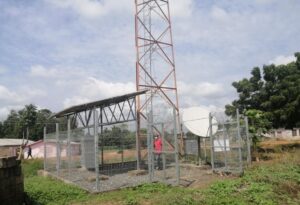
K-NET is also very big on rural telephony, and that is something that not many know about. The company works with the Ghana Investment Fund for Electronic Communications (GIFEC) to provide over 40 solar-powered telecom towers and counting in unserved and underserved communities to ensure the telcos can provide connectivity to those communities at affordable rates.
The innovative and cost-effective K-NET towers called the MRIID (Managed Rural IT Infrastructure Development), provide a very welcoming access to telcos to co-locate at a very affordable rate in areas where ARPU (average revenue per user) is low for telcos. K-NET provides the towers at a monthly fee. This is to encourage telcos to provide services to the rural folks, who would otherwise have been denied connectivity due to the high cost of provision against low revenue.
But more importantly, what MRIID does is it helps the rural folk to be digitally included in the sense that they have access to the connectivity needed to improve economic activities, health, education and many more; and they are also able to fully participate in socio-political issues effectively.
Smart solar energy as a service
Another thing that makes K-NET very innovative is the fact that they power most of their sites with solar energy thereby being environmentally. In fact, they have launched a new product called Energy as a Service (EaaS), using solar to power sites for corporations and operators, who pay minimal bills for energy usage. This is available at various locations across the country and the West African region.
Managed services
One other thing that people are not too aware of is that, over the years, K-NET has provided Managed Networking and Communications solutions (Data, Voice and Video) to large, medium and small businesses throughout Ghana with an average annual growth rate of nearly 200percent year to year. No other primary data communications services provider in Ghana has rivalled this achievement.
Many tend to think that all the internet services provided to corporate organizations are done by either telcos or the well-known ISPs. But a significant chunk of corporate Ghana access their internet services directly from K-NET because it is more reliable than what a lot of the known ISPs and telcos offer. The proof of reliability of K-NET’s internet services is such that most banks and financial institutions in the country, including Ecobank, use K-NET rather than any other. Banks cannot get it wrong on their digital services, and that is why they use K-NET.
Undersea fibre outage
Indeed, the company’s clients are corporate organizations, whose main lines of businesses include banking, mining, TV and Radio broadcasting, publishing, manufacturing, education, governance, and merchandizing. Recently, when Ghana and some African countries suffered internet outage due to the cut in the undersea cables that serve Ghana, institutions connected to K-NET were among those who got service restored in less than 24 hours, because K-NET has redundancy on cables coming from directions, outside of the ones that go damaged.
Saving Liberia
K-NET has strong footprints in parts of West Africa, particularly Sierra Leone and Liberia. Indeed, when Ebola broke out in 2014, Liberia was the hardest hit on the continent, and several technology service providers, including telcos virtually bailed out on that country, leaving it in digital darkness and no access to communicate with the rest of the world. K-NET was the only technology company that went into Liberia at the time and provided internet connectivity to enable them have access to the rest of the world in that crisis moment.
Big global partners
It is worthy of note that KNET also provides uplink services across Africa for the French global broadcaster, Canal+ among others. On the back of its bespoke infrastructure, K-NET offers VSAT Hub Lease (HNO & VNO) Services, VSAT Managed Services, Space Tracking Station services, Earth Station Antenna Lease, 24/7 Global NOC with TAC assistance.

Content support for broadcasters
To further stamp its authority in the area of quality television viewing experience, K-NET has now positioned itself to receive content from around the world through fibre on Zixi and SRT and distribute across Africa. The company also runs a smart OB (outside broadcast) van, which sits in Accra, but is able to receive live feed from anywhere in the world and deliver it in real-time to any part of the continent. Indeed, with its smart OB, K-NET can cover live events and deliver the content to anywhere on the continent per client specifications.
In Ghana for instance, K-NET does live coverage of major football games and other national events for the state broadcaster and other channels on the DTT and DTH platforms. A case in point is the FIFA World Cup Qualifier game between Ghana and the Central Africa Republic in Kumasi this week.
The company has worked with some of the leading mobile operators in various capacities, including but not limited to providing support in backhauling GSM traffic from remote rural communities; and also as an ISP providing data connectivity to their subscribers.
K-NET has indeed remained the most silent technology and digital industry giant, whose work and solutions impacts almost every Ghanaian and the peoples of other countries but the company has done all this on the quiet.
The company prides itself as the only indigenous technology company that is well positioned to seamlessly power the realization of an integrated ECOWAS. It is safe to say that the K-NET is one of the institutions with the requisite tools, expertise and solutions to help Africa leapfrog the hurdles in the way of its digital transformation and bridge the digital divide faster.

